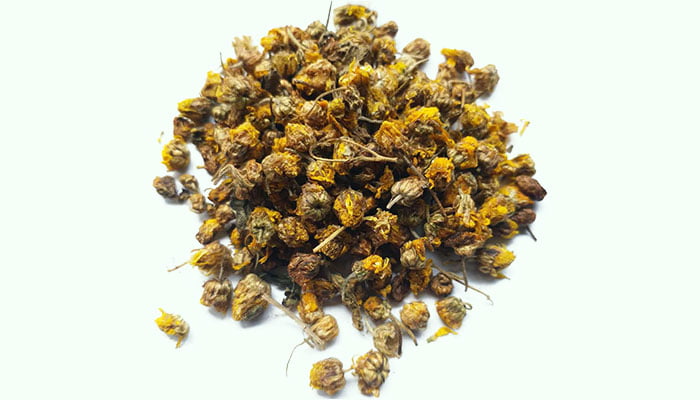What Is Ye Ju Hua
Ye Ju Hua also known as Wild Chrysanthemum Flower or Flos Chrysanthemi Indici is the flower head of Chrysanthemum indicum, which is a perennial herb belonging to the family Asteraceae. It is a relatively practical and common Chinese herbal medicine, which first appeared in <Jing Yue Quan Shu> in 1,624 AD.
This plant is hardy and likes a humid climate. They can grow well in deep, loose, fertile, and humus-rich loam. They often grow on hillsides, grasslands, shrubs, rivers, fields, or roadsides. They can be found in many countries in Asia.
In the autumn and winter of each year, people gather the newly blooming flower heads of Chrysanthemum indicum, remove their impurities, dry them in the sun, and make them into Chinese herbal medicines.

Ye Ju Hua contains yejuhualactone, chrysanthemol, chrysanthetriol, chrysanthenone, cis-spiroenol ether, trans-spiroenol ether, arteglasin, linarin, luteolin, acacetin, chlorogenic acid, palmitic acid, sitosterol, daucosterol, amino acids, purines, choline, stachydrine, tannin, vitamins, chlorophyll, polysaccharides, proteins, and various inorganic elements.
Ye Ju Hua with yellow flower, complete inflorescences, and a strong fragrance is preferred.
According to <Compendium of Materia Medica>, the medicinal nature of Ye Ju Hua is slightly cold, with a bitter and pungent taste. It has a certain therapeutic effect on the pathological changes of the liver and heart meridians.
In traditional Chinese medicine, Ye Ju Hua is often used to clear heat and remove toxins, dispel wind and heat, treat pneumonia, tuberculosis, hypertension, aphtha, chronic prostatitis, neonatal impetigo, eczema, rubella, erysipelas, and a variety of bacterial infectious diseases.
There are about 100 kinds of Chinese medicine prescriptions containing it, such as Gan Mao Ling, Compound Yigan Pills, and Bi Yan Pian.
Benefits
- Anti-inflammation, inhibiting xylene-induced ear swelling in mice and Freund’s adjuvant-induced foot swelling in rats.
- Anti-oxidation, scavenge hydroxyl free radicals, ABTS free radicals, and superoxide anion free radicals.
- Raising the pain threshold and inhibiting the writhing pain in mice caused by acetic acid.
- Increasing spleen index and thymus index, enhancing the phagocytic ability of macrophages and improving immunity.
- Inhibiting platelet aggregation caused by adenosine diphosphate or collagen.
- Reducing blood viscosity, relaxing vascular endothelial cells, and lowering blood pressure.
- Reducing the damage of alcohol, CCL4, or Concanavalin A to liver tissue and protecting the liver.
- Removing heat toxins, relieving skin swelling and pain, and treat furuncles, carbuncles, and erysipelas caused by heat toxins.
- Dispelling wind and heat, relieving eye redness and swelling pain caused by wind-heat.
- Purging liver fire and treat headache and dizziness caused by the up-flaming of liver fire.
- The topical application of its decoction can relieve itching and treat eczema, acne, and rubella.
- Inhibiting the proliferation of lung cancer A549 cells, human prostate cancer cells PC3, myeloid cells HL60, human gastric cancer 803 cells, and human cervical cancer Hella cells, and inducing apoptosis of human osteosarcoma Saos-2 cells and human osteosarcoma MG-63.
- Inhibiting Staphylococcus aureus, Diphtheria bacillus, Escherichia coli, Pseudomonas aeruginosa, Shigella flexneri, Streptococcus pneumoniae, Mycobacterium tuberculosis, and Candida albicans.
Combinations
- It can be used in combination with Jue Ming Zi (Cassia Seed), etc. to treat headaches and dizziness caused by the up-flaming of liver fire.
- It can be used in combination with Jin Yin Hua (Flos Lonicerae), Yu Xing Cao (Houttuynia Cordata), Chai Hu (Radix Bupleuri), Bo He (Mentha), etc. to treat upper respiratory tract infections in children.
- It can be used in combination with Guan Zhong (Dryopteris), Tu Fu Ling (Rhizoma Smilacis Glabrae), Mu Dan Pi (Cortex Moutan), etc. to treat hepatitis B.
- It can be used in combination with Jin Yin Hua (Flos Lonicerae), Mi Meng Hua ( Flos Buddlejae), Xia Ku Cao (Spica Prunellae), etc. to treat the swelling and pain of the eyes caused by wind-heat.
- It can be used in combination with Pu Gong Ying (Taraxacum), Zi Hua Di Ding (Viola Yedoensis), Jin Yin Hua (Flos Lonicerae), etc. to treat furuncles, carbuncles, and erysipelas caused by heat toxins.
Side Effects
- At present, no data is showing that Ye Ju Hua has toxic effects.
- A small proportion of patients taking it may cause gastrointestinal reactions such as stomach discomfort, loss of appetite, borborygmus, or loose stools.
- A small proportion of patients may cause mild diarrhea due to intramuscular injection of Ye Ju Hua injection.
Precautions and Warnings
- The dosage of Ye Ju Hua should be controlled between 10-15g.
- It can be made into an oral decoction or be used to soak and wash the affected part.
- People who are allergic to Ye Ju Hua should not take it.
- Patients with qi deficiency or deficiency-cold in the spleen and stomach should not take it.
- Patients with anorexia or loose stools should not take it.
- Pregnant women and children should not take it.
- Both Ye Ju Hua and Ju Hua (Flos Chrysanthemi) have the effects of clearing heat and removing toxins, purging fire and calming the liver. They can all be used to treat dizziness, headaches, redness and swelling of the eyes. Ju Hua (Flos Chrysanthemi) is mainly used to treat wind-heat and cold, headache, dizziness, red and swollen eyes, and blurred vision. Ye Ju Hua is mainly used to treat deep-rooted boils and carbuncles.
